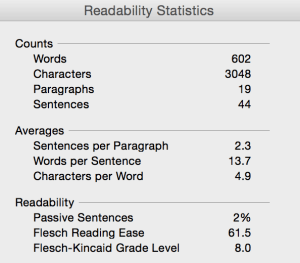
How Content Marketing Loses Global Customers & What To Do
Almost 2 billion people know some English, but few read as well as natives.
For global customers, write in simple English and add familiar industry terms.
Many B2B marketers create content for global companies. We seek to reach buyers around the world. But too often, we shoot ourselves in the foot by using words and sentences that are just too hard for global audiences.
Bear in mind your customers’ English. Keep your words simple and global.
English is becoming the leading international language, says John H. McWhorter in his recent Wall Street Journal essay “What the World Will Speak in 2115.” He notes that English is now performing the “universal language” role once imagined for Esperanto.
At home, all of us are most comfortable speaking our native tongues. But when people reach beyond a local audience, English has become the language of choice. It’s an antidote to the Tower of Babel problem.
Almost 2 billion people already speak English to some degree, McWhorter says. English is well on the way to being spoken by 1 out of 3 people in the world. A century from now, McWhorter expects English to be the preferred global language.
English remains the Internet’s dominant language today. Even people who speak other languages blog in English. As Ahmad Humeid, who writes the 360 East blog, said, “I want my perspectives on Jordan to be read around the world, which means I need to write in English.”
To reach a broad global audience, content marketing needs to use simple, global English. For example, this blog reaches readers in more than a dozen countries already. Larger companies may serve customers in 100 countries or more.

To grow your global audience, keep words, sentences and paragraphs short. Choose simple words. Use Flesch-Kincaid to test readability: this blog, for example, reads at an 8th-grade level.
Recall when you first learned to speak? You learned the simplest, shortest words first. Your first 100 words enabled you to say a lot, enough to get your point across.
That begs the question for content marketing: how big a vocabulary should we use to make a point with a global audience?
When you learn a new language, vocabulary and grammar come to you gradually. I speak from direct experience as a second-year French student at Alliance Française, where I learn a few new French words and constructions each week.
Since my French-speaking friends know I’m just learning the language, they speak simply and a bit more slowly, so I can follow the conversation. That takes a bit of extra effort on their part – the same kind of effort we need to make in global content marketing.
Content marketing can learn a lesson from the Voice of America (VoA), which chooses simple words for global audiences. VoA broadcasts in English, mostly in countries where people know some English as a second language. VoA developed a 1,500-word vocabulary to maximize understanding among non-native English speakers.
Make your content fit for global readers. That’s right, 1,500 words are enough to report the news, explain technology, and tell stories well. The VoA’s vocabulary lists the words that are simple enough for global audiences.
If your industry speaks its own language, as many do, add in key industry-specific terms. Consider buyers’ needs: speak simple English plus the familiar industry terms they already know.
Simple, global English helps you reach a bigger audience of readers and potential customers. It enables both non-native English speakers and native English speakers to understand you better.
In the end, more understanding leads to more conversations and more sales. And that’s what content marketing is all about.
Contact Us
Related Posts
Top 100 Content Marketing Question: What is the best length of content?
The best length of content? The length your buyer wants now. What is the best length of content? Start with this fact: people’s initial...
15 Aha! Moments from BMA 2015 for Content Marketing
Ready for 3 days of learning from the Business Marketing Association 2015 #BMA15 conference, packed into 15 aha! moments? Here goes. What’s changing with...
Global Telecoms Business: “Strategic content marketing educates customers and opens their wallets”
Read full article in Global Telecoms Business. Excerpt follows: Strategic content marketing educates customers and opens their wallets The scarcest commodity today is your customers’...
“How do you convey something very complex in content marketing?”
How to make complex content simple Marketers who work in technology, finance, health care, and science-related fields face a common challenge: how to communicate...





